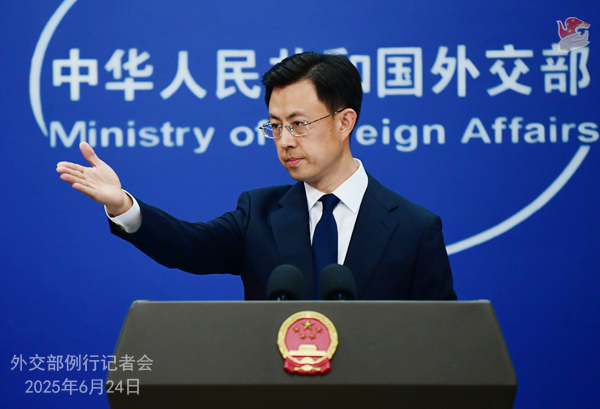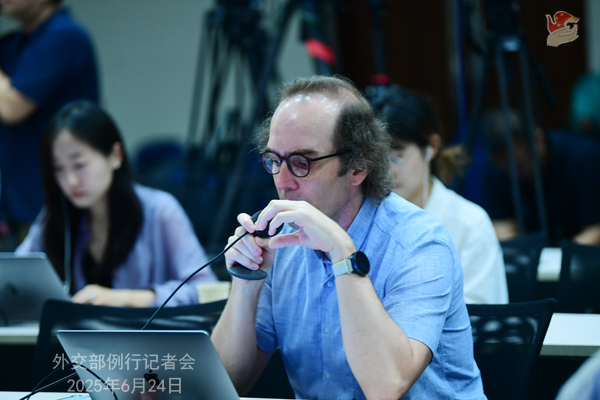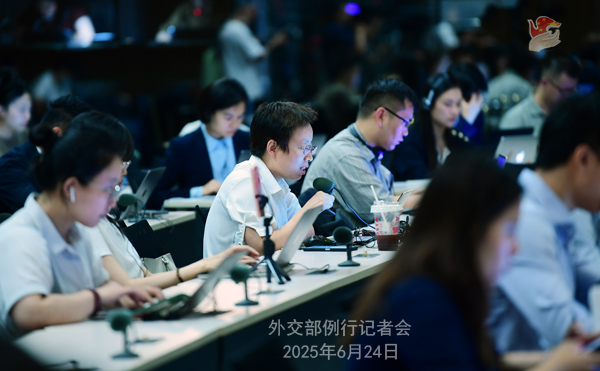
People’s Republic of China


Premier of the State Council Li Qiang will attend and address the Opening Ceremony of the 10th Annual Meeting of the Asian Infrastructure Investment Bank Board of Governors in Beijing on June 26.
CCTV: To follow up on your announcement that Premier Li Qiang will attend the Tenth Annual Meeting of Board of Governors of AIIB, what’s China’s expectation for the meeting?
Guo Jiakun: The Asian Infrastructure Investment Bank (AIIB) is a new type of multilateral development bank for the 21st century that was established under President Xi Jinping’s proposal and commitment. Since its establishment in 2015, thanks to the joint support from all of its members, AIIB has acted as a truly international, rule-based and high-standard institution, achieved leapfrog development and become a new and important member of the system of global multilateral development institutions, making active contributions to global infrastructure development and sustainable growth.
This year’s annual meeting under the theme of “Connecting for Development, Collaborating for Prosperity” will take stock of what has been achieved in the past decade and chart the course for the next decade, and is of crucial significance. China looks forward to working with all parties to jointly support AIIB’s development, make new and greater contributions to promoting infrastructure connectivity and sustainable development in Asia and improving the global economic governance system, and better build a community with a shared future for mankind.
Folha de S.Paulo: Is Chinese leader going to attend the BRICS Summit in Rio on July 6 and 7? When will the visit’s schedule be available?
Guo Jiakun: As two major countries in the world and representative members in the Global South, China and Brazil have maintained our strategic resolve and made active contributions to global peace, stability and development together in a volatile and turbulent world. China supports Brazil’s BRICS presidency and will jointly move forward the greater BRICS cooperation. On your specific question, we will release information in due course. Please stay tuned.
Anadolu Agency: U.S. President announced that a ceasefire was agreed between Israel and Iran. What’s China’s comment?
Guo Jiakun: China is watching closely the developments in the Middle East. We do not want to see the spiraling up of tensions, and hope that a ceasefire can be realized as early as possible. Facts have proven that military means cannot bring peace, and the right way of solving issues is dialogue and negotiation. China calls on parties concerned to return to the right track of political settlement at an early date. We stand ready to work with the international community and make effort for peace and stability in the Middle East.

Bloomberg: China has moved to tighten controls over two chemicals that can be used to make fentanyl. We’re wondering was this done at the behest of or in cooperation with the U.S.? Does the Ministry have any other details to add on fentanyl controls or any other cooperation with the U.S.?
Guo Jiakun: Competent authorities in China have released a statement on that, which you may refer to. It is a step taken by the Chinese government to fulfill its obligations as a signatory of the UN conventions on drug control with the aim of keeping precursor chemicals under strict control. This effort demonstrates China’s attitude of actively participating in global drug governance and its sense of responsibility as a major country.
The day after tomorrow, or June 26, is the International Day Against Drug Abuse and Illicit Trafficking. China is one of the world’s strictest countries on counternarcotics both in terms of policy and its implementation. The issue of fentanyl abuse does not exist in China. Besides, we’ve also fully promoted and deeply participated in the global governance of drug-related issues and carried out fruitful counternarcotics cooperation with other countries.
We’ve repeatedly made it clear that fentanyl is the U.S.’s problem, not China’s. It’s the U.S.’s responsibility to solve the issue. Despite the goodwill China has shown, the U.S. wrongly slapped tariffs on Chinese imports by citing the issue of fentanyl. The move has dealt a heavy blow to China-U.S. dialogue and cooperation on counternarcotics, and gravely hurt China’s interests. If the U.S. truly wants to cooperate with China, it needs to face the facts squarely, correct its wrongdoing, and seek dialogue with China based on equality, respect and mutual benefit.
Bloomberg: Israeli Prime Minister Benjamin Netanyahu has confirmed Israel agreed to a truce with Iran. Would the Ministry like to comment on this latest development?
Guo Jiakun: I answered a similar question just now. Let me stress once again that China is watching closely the developments in the Middle East. We do not want to see the spiraling up of tensions, and hope that a ceasefire can be realized as early as possible.
Shenzhen TV: It is reported that Zhang Junqiao, captain of the 27th Chinese medical team in Tanzania, died after rescuing a local woman who was drowning off the coast of Dar es Salaam. Does the Foreign Ministry have any comment?
Guo Jiakun: Zhang Junqiao’s heroic act exemplifies the deep China-Africa friendship and the extraordinary dedication, commitment, love and fighting spirit of Chinese medical teams. Our thoughts are with Zhang Junqiao’s family, and it is absolutely painful to lose a dear and stellar member of Chinese medical teams in Africa. It’s been 62 years since China sent its first medical team to Africa in 1963, and almost 58 years since China began sending medical teams to Tanzania. The caring and highly skilled members of Chinese medical teams have treated and saved many local people, and trained medical teams of their own. The work of the medical teams has contributed so much to China-Africa friendship. The people of China and Africa will never forget. History will not forget.
PTI: Do you have any comment on the Shanghai Cooperation Organization national security advisers’ meeting that’s currently being held in Beijing? Can you just provide some inputs regarding that?
Guo Jiakun: On the Meeting of the SCO Security Council Secretaries, please stay tuned.
Global Times: Recently, the Organization of Islamic Cooperation (OIC) held its 51st session of the Council of Foreign Ministers in Istanbul, Türkiye. The meeting spoke positively of the development of China-OIC relationship. What’s your comment?
Guo Jiakun: From June 21 to 22, the OIC Council of Foreign Ministers held its 51st session. The meeting recognized China’s efforts in protecting Muslim communities, appreciated the all-rounded development of relations between China and Islamic countries, and expressed expectations for stronger OIC-China cooperation. This marks the sixth consecutive time that the resolutions of OIC Council of Foreign Ministers contain positive wording on China. China welcomes that.
The OIC is a symbol of unity and independence among Islamic countries and a bridge for promoting relations between China and Islamic countries. In recent years, China and Islamic countries and the OIC have deepened mutual trust, expanded cooperation in various fields, and strengthened exchanges among civilizations, which has yielded fruitful outcomes. Representatives of the OIC and its member states have visited China many times, including trips to Xinjiang. They have gained a better understanding of and spoken positively of China’s ethnic and religious policies, and the development in Xinjiang. China will continue to work together with Islamic countries and the OIC for the sustained growth of our relations.




